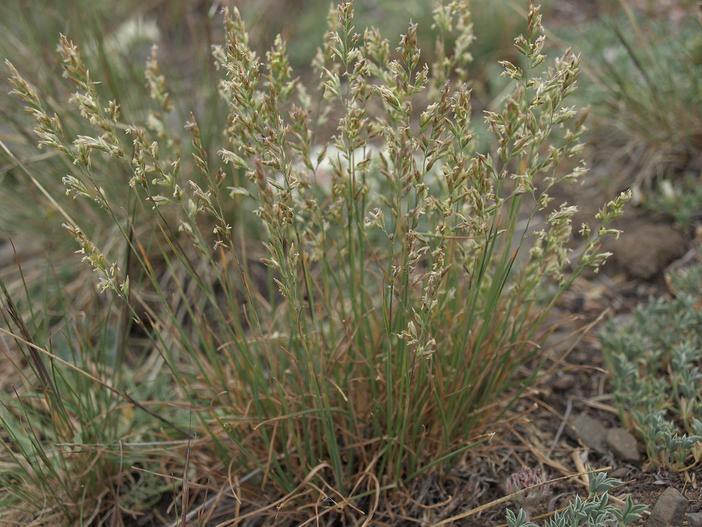Sandberg Bluegrass
(Poa secunda)
Sandberg Bluegrass (Poa secunda)
/
/

Jim Morefield
CC BY-SA 2.0
Image By:
Jim Morefield
Recorded By:
Copyright:
CC BY-SA 2.0
Copyright Notice:
Photo by: Jim Morefield | License Type: CC BY-SA 2.0 | License URL: https://creativecommons.org/licenses/by-sa/2.0/ | Uploader: Jim Morefield | Publisher: Flickr

























Estimated Native Range
Summary
Poa secunda, commonly known as Sandberg bluegrass, among other names, is a perennial bunchgrass native to a variety of habitats including grasslands, open woodlands, and forest edges across North and South America. It is a versatile species, often found in arid and semi-arid regions, reflecting its high drought tolerance. Poa secunda typically grows to a modest height of 10-60 cm and is characterized by its fine-textured foliage and blue-green color, which may turn golden in the fall. It produces inconspicuous flowers that are wind-pollinated, with a flowering season that generally spans late spring to early summer.
This grass is valued for its resilience to drought and its ability to thrive in a range of soil types, making it an excellent choice for erosion control and restoration projects, including post-wildfire revegetation. It is also used as fodder for livestock due to its nutritional value. Poa secunda requires minimal maintenance, making it suitable for xeriscaping and as a low-water turf alternative. It performs best in full sun to part shade and prefers well-drained soils. While it is not known for aggressive roots or significant disease problems, overwatering or poor drainage can lead to root rot. Cultivars like ’Canbar’, ’Service’, ’Sherman’, and ’Supernova’ have been developed for specific uses, such as improved forage quality or growth characteristics.CC BY-SA 4.0
This grass is valued for its resilience to drought and its ability to thrive in a range of soil types, making it an excellent choice for erosion control and restoration projects, including post-wildfire revegetation. It is also used as fodder for livestock due to its nutritional value. Poa secunda requires minimal maintenance, making it suitable for xeriscaping and as a low-water turf alternative. It performs best in full sun to part shade and prefers well-drained soils. While it is not known for aggressive roots or significant disease problems, overwatering or poor drainage can lead to root rot. Cultivars like ’Canbar’, ’Service’, ’Sherman’, and ’Supernova’ have been developed for specific uses, such as improved forage quality or growth characteristics.CC BY-SA 4.0
Plant Description
- Plant Type: Grass
- Height: 1.4-3.3 feet
- Width: 0.5-2 feet
- Growth Rate: Moderate
- Flower Color: N/A
- Flowering Season: Spring
- Leaf Retention: Semi-Deciduous
Growth Requirements
- Sun: Full Sun, Part Shade
- Water: Low
- Drainage: Medium, Fast
Common Uses
Butterfly Garden, Drought Tolerant, Fire Resistant, Groundcover, Low Maintenance
Natural Habitat
A variety of habitats including grasslands, open woodlands, and forest edges
Other Names
Common Names: alkali bluegrass, big bluegrass, Canby’s bluegrass, Nevada bluegrass, one-sided bluegrass, Pacific bluegrass, pine blugrass, slender bluegrass, wild bluegrass, curly bluegrass
Scientific Names: , Poa secunda, Poa secunda var. scabrella, Poa sandbergii, Poa scabrella, Poa canbyi, Poa gracillima, Poa secunda var. nevadensis, Poa secunda var. ampla, Poa buckleyana
GBIF Accepted Name: Poa secunda J.Presl